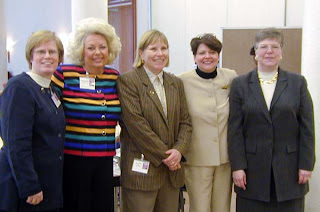 Italy . . . Sicily . . . Italia . . . Sicilia. I had been to Italy many times and loved it, but like many Americans, I had preconceived ideas about Sicily. And they weren’t good. It wasn’t until I paid a couple of visits there in my AVID job with DoDDS-Europe that I discovered Sicily was a well-kept secret. I decided that if I ever had the chance, I would like to live there. Lo and behold, my chance came in 2004 when Bad Aibling closed and I got a transfer there. I was thrilled to move to Sicily and to go to work with my friend Marj Lewallen as my principal.
Italy . . . Sicily . . . Italia . . . Sicilia. I had been to Italy many times and loved it, but like many Americans, I had preconceived ideas about Sicily. And they weren’t good. It wasn’t until I paid a couple of visits there in my AVID job with DoDDS-Europe that I discovered Sicily was a well-kept secret. I decided that if I ever had the chance, I would like to live there. Lo and behold, my chance came in 2004 when Bad Aibling closed and I got a transfer there. I was thrilled to move to Sicily and to go to work with my friend Marj Lewallen as my principal.I have a whole blog dedicated just to living in Sicily: Sicilian Odyssey. I knew it would be a special experience, and I wanted to share that with as many friends as possible. Blogs were something I had only heard of, but I decided to try it out. As of today, that blog about Sicily has had over 40,000 visitors!
Sigonella has been a wonderful place to live, to work, and to end my career in teaching. I feel like I’ve done my best teaching, learned the most, had the greatest impact, and made many friends for life.

How was my teaching experience here different from any other? The two major factors that made it so unique were (1) the Navy and (2) Sicily. All of my other DoDDS locations had been with the Army, and, while I love Navy kids and families, I have to say the Navy itself nowhere near as supportive or responsive as the Army. They mainly seem annoyed if they have to deal with you at all. And they just aren’t efficient or available. The community commander put up a wall, a fence, and a gate between his house and the school which just about started World War III. He didn’t even want teachers and kids walking on “his” street.
Sicily is what I call a “Two-and-a-half World Country,” not quite Third World, but close. Things never run smoothly and that affects our school. While we have, by far, the most beautiful new school in DoDDS-Europe, it is near impossible to get things running right or fixed. The fire alarm sounds in one building but not the other. But, you can have expresso or cappuccino with fresh Italian pastries at any time in the cafeteria (even some of the kids go for this stuff), palm trees and flowers surround the school, we have an original Sicilian cart in the foyer, sunshine three hundred days a year, and a view of Mount Etna to die for. The entire base is brand-new and looks more like a southern California college campus than a military base.

Because Sicily is at the southernmost tip of Europe, and our kids still compete in all the DoDDS sports, and it’s a very small high school (about 200), I fondly refer to it as Sigonella Part-time High School. More than half of our sporting events are away, which means at least one day of school missed for travel every week of every season. During tournament time, that equates to multiple days missed. During the recent spring sports tournaments, I actually had only twenty-six kids present and thirty-six absent over a two-day period. They bus them on 12-20 hours bus trips and sometimes fly the teams to Germany to compete. And this is a little-bitty high school, so they compete in the Championship for Little-Bitty Schools!
 Navy kids and families, as I said, are great. There is a large Filipino population, which I had never experienced before, and the families are super-supportive of their kids’ success. They were great to work with.
Navy kids and families, as I said, are great. There is a large Filipino population, which I had never experienced before, and the families are super-supportive of their kids’ success. They were great to work with. Chaos often reigns at Sigonella, for a variety of reasons, but, in the end, it’s always the teachers who pull things together and make them happen. At the beginning of the 2007-08 school year, we started the year with two new administrators (both with little to no experience), no secretary/personnelist, no supply clerk, and no registrar. But did we let that stop us? No! We opened on time just like everything was hunky-dory. We have some highly-dedicated, hard-working teachers and staff that go above and beyond (often) for the kids and the school. You have to be pro-active to get the things you need, to get things fixed, and to make things happen. Luckily, I have quite a few colleagues here who do just that: the ed tech who gerry-rigs the SMART board to make it work, the teacher who petitions the State Department to increase our Living Quarters Allowance, and school nurse who sponsors student council are just a few examples. Virtually everyone goes above and beyond to ensure a quality educational experience for these kids. (Below, Tina, Kendra, Pat and I lunching with The Standards)
Chaos often reigns at Sigonella, for a variety of reasons, but, in the end, it’s always the teachers who pull things together and make them happen. At the beginning of the 2007-08 school year, we started the year with two new administrators (both with little to no experience), no secretary/personnelist, no supply clerk, and no registrar. But did we let that stop us? No! We opened on time just like everything was hunky-dory. We have some highly-dedicated, hard-working teachers and staff that go above and beyond (often) for the kids and the school. You have to be pro-active to get the things you need, to get things fixed, and to make things happen. Luckily, I have quite a few colleagues here who do just that: the ed tech who gerry-rigs the SMART board to make it work, the teacher who petitions the State Department to increase our Living Quarters Allowance, and school nurse who sponsors student council are just a few examples. Virtually everyone goes above and beyond to ensure a quality educational experience for these kids. (Below, Tina, Kendra, Pat and I lunching with The Standards) I have had the best social life of my teaching career here in Sigonella. Maybe it’s because we are isolated and remote, but colleagues become friends become “family.” They are generally an inclusive group, and one never feels uninvited or left out. There are some “characters” here. I think that is the type of DoDDS teacher who thrives in Sicily. Outings, get-togethers, and support are abundant. We really care about each other. That is the magic of Sigonella.
I have had the best social life of my teaching career here in Sigonella. Maybe it’s because we are isolated and remote, but colleagues become friends become “family.” They are generally an inclusive group, and one never feels uninvited or left out. There are some “characters” here. I think that is the type of DoDDS teacher who thrives in Sicily. Outings, get-togethers, and support are abundant. We really care about each other. That is the magic of Sigonella.







































 (This photo from a 1984 newspaper shows us in gale-force winds and me six months preganant!)
(This photo from a 1984 newspaper shows us in gale-force winds and me six months preganant!)

